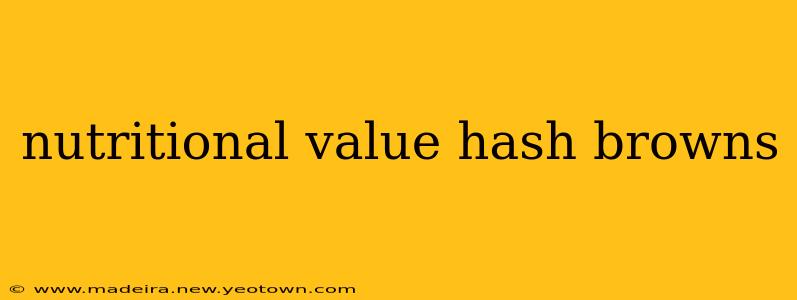Hash browns. The crispy, golden-brown, breakfast staple that's as comforting as it is versatile. But beyond the delightful crunch and satisfying flavor, what's the true nutritional story behind these beloved potato patties? Let's peel back the layers and explore the nutritional value of hash browns, addressing some common questions along the way.
What are the nutritional benefits of hash browns?
This depends heavily on how your hash browns are made! A simple, home-cooked version made from scratch with minimal oil will offer a different nutritional profile than those found in fast-food restaurants or pre-packaged frozen varieties. Generally speaking, hash browns are a source of carbohydrates, providing energy. Potatoes themselves are a good source of potassium, a crucial mineral for maintaining healthy blood pressure. They also contain some vitamin C, though cooking methods can significantly affect its retention.
However, the nutritional value can be significantly impacted by added ingredients and cooking methods. The use of excessive oil during frying dramatically increases the fat content, adding calories and potentially impacting the overall healthfulness. Similarly, added salt contributes to high sodium levels.
Are hash browns healthy?
The "healthiness" of hash browns is a nuanced question. On their own, potatoes aren't inherently unhealthy, providing carbohydrates for energy and some essential nutrients. But the preparation method dramatically alters their nutritional profile. A small serving of home-made hash browns, pan-fried with a minimal amount of healthy oil, can be part of a balanced diet. However, deep-fried or heavily oiled hash browns, particularly those laden with salt, are considerably less healthy due to their high fat and sodium content.
Think of it this way: a small serving of carefully prepared hash browns is different from a large portion of heavily processed, restaurant-style hash browns.
How many calories are in hash browns?
The caloric content of hash browns varies wildly depending on the size of the serving, the type of potato used, the amount of added oil or fat, and the presence of any additional ingredients like cheese or onions. A small serving of home-made hash browns might contain anywhere from 100-200 calories, while a larger serving from a fast-food restaurant could easily exceed 300 or even 400 calories. Always check the nutritional information provided by the restaurant or manufacturer for the most accurate calorie count.
What are the nutritional facts of hash browns?
Providing precise nutritional facts is challenging without specifics on the preparation method and ingredients. However, we can offer a general overview based on a small serving (approximately 100g) of home-made hash browns, made with russet potatoes and minimal oil:
- Calories: Approximately 150-200
- Carbohydrates: A significant portion, primarily from the potatoes.
- Protein: Relatively low.
- Fat: Low to moderate, depending on oil used and quantity.
- Fiber: Moderate, depending on the potato type and cooking method.
- Potassium: A decent amount, beneficial for blood pressure.
- Vitamin C: Some, though heat reduces levels.
Are hash browns good for weight loss?
Hash browns are not ideal for weight loss due to their carbohydrate and potential fat content. While a small portion might fit into a carefully planned diet, they are calorie-dense and should be consumed sparingly if weight loss is a primary goal. Focusing on lean protein sources, plenty of vegetables, and whole grains is generally a better strategy for sustainable weight loss.
How can I make healthier hash browns?
The key to healthier hash browns lies in mindful preparation. Here are some tips:
- Use less oil: Opt for a non-stick pan and use only a small amount of cooking spray or a healthy oil like olive oil.
- Choose the right potato: Russet potatoes are a common choice, but consider using a lower-starch variety for a slightly lower calorie option.
- Control portion sizes: Stick to a smaller serving to manage calorie intake.
- Add vegetables: Increase the nutritional value by incorporating shredded carrots, zucchini, or bell peppers.
- Reduce salt: Season with herbs and spices instead of relying heavily on salt.
By making smart choices in preparation and ingredients, you can enjoy the deliciousness of hash browns without compromising your health goals. Remember, moderation and mindful eating are key to a balanced diet.

